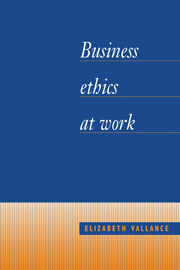2 - The nature and aim of business
Published online by Cambridge University Press: 05 June 2012
Summary
Man exploits man and sometimes the other way round.
(Woody Allen)Every individual … intends only his own gain and he is in this … led by an invisible hand to promote an end which is no part of his intention.
(Adam Smith, The Wealth of Nations)Any investigation of business ethics must begin by looking not only at ethics and the ways in which it relates to business, but at business itself. If we want to discover how and in what ways values can underpin business decisions, we have first to be clear what form business activity itself takes: what, in other words, are its aims and aspirations. As Aristotle tells us, it helps in hitting the mark to know what it is you are aiming for. The idea is so basic, of such stunning simplicity, that it is easy to underestimate its importance. Success in business may involve the evolution of strategies of considerable complexity; but logically prior to debates on the value of strategic planning or financial control has to be the question of the aim of business itself. It is unlikely you will hit the mark, regardless of the sophistication of your plan or the extent of your skill, if you do not know, absolutely and unswervingly, what your target is.
In these terms, a fundamental question of business ethics is ‘What is business for?’ This is not merely a semantic exercise, for it is crucial to clear decision-making in business that business itself can be distinguished from other superficially similar kinds of organisation.
- Type
- Chapter
- Information
- Business Ethics at Work , pp. 26 - 41Publisher: Cambridge University PressPrint publication year: 1995



